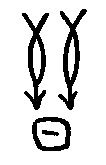I Ching, Yijing or Zhou Yi
"Oracle of the moon": © 2000 LiSe
 Yi Jing, Oracle of the Moon
Yi Jing, Oracle of the Moon



HEXAGRAM 35, JIN
The character represents two arrows and a container or a support. It might be like the saying of having enough arrows in one's quiver. Yet another possibility is: a representation of Kang Hou mating his horses three times a day. In that case it would be a phallus or lingam (two or many) and a vulva or joni.
I took the liberty to see the container
as a quiver, because that is where arrows usually are kept. Another
possibility is: arrows presented as a gift, 'brought forward', hence placed on a
support - Karlgren GSR nr.378.
In the judgment it says 'The powerful prince is
honored with horses in large numbers. In a single day he is granted
audience three times'.
A closer
look at the characters of this sentence reveals many different things.
'Powerful', Kang, is the name of a younger brother of King Wu. He is
Kang Hou, the marquis of Kang (see Marshall 'The Mandate of Heaven').
He did indeed receive a gift of horses, but
probably not such a large number. The sentence says: use - gift - horses
- multiply - multitude. So the large number came into being by his own
doing.
How? Well, the sentence continues: daytime -
sun (or day) - three - mate. The character 'daytime' indicates something
delineated by boundaries, so together with day it means 'in one day'. He did it by
mating the horses three times a day.
So if you get hexagram 35 it means a progress that you make yourself. Grasp the chances who present themselves and make the best of them, be alert so you will not miss an opportunity. Look curious and inventive to everything that comes into your life, and always have enough arrows in your quiver. Or make the best use of everything you encounter: not using things up, but multiplying them.